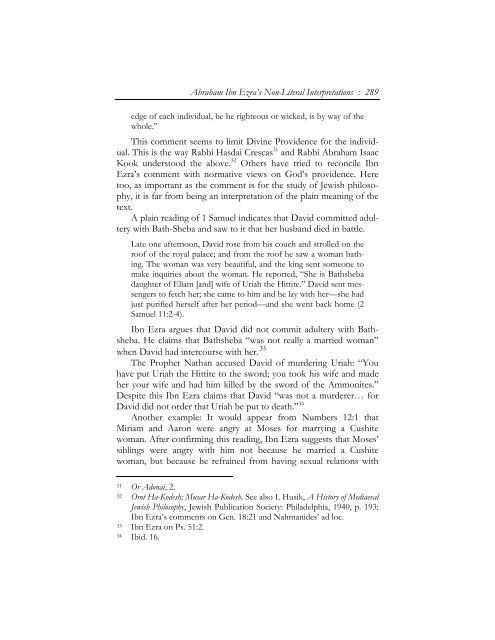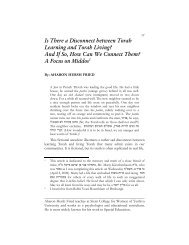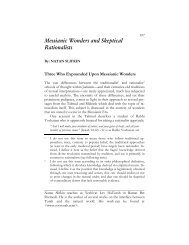Abraham Ibn Ezra's Non-Literal Interpretations - Hakirah.org
Abraham Ibn Ezra's Non-Literal Interpretations - Hakirah.org
Abraham Ibn Ezra's Non-Literal Interpretations - Hakirah.org
Create successful ePaper yourself
Turn your PDF publications into a flip-book with our unique Google optimized e-Paper software.
<strong>Abraham</strong> <strong>Ibn</strong> Ezra’s <strong>Non</strong>-<strong>Literal</strong> <strong>Interpretations</strong> : 289edge of each individual, be he righteous or wicked, is by way of thewhole.”This comment seems to limit Divine Providence for the individual.This is the way Rabbi Hasdai Crescas 31 and Rabbi <strong>Abraham</strong> IsaacKook understood the above. 32 Others have tried to reconcile <strong>Ibn</strong>Ezra’s comment with normative views on God’s providence. Heretoo, as important as the comment is for the study of Jewish philosophy,it is far from being an interpretation of the plain meaning of thetext.A plain reading of 1 Samuel indicates that David committed adulterywith Bath-Sheba and saw to it that her husband died in battle.Late one afternoon, David rose from his couch and strolled on theroof of the royal palace; and from the roof he saw a woman bathing.The woman was very beautiful, and the king sent someone tomake inquiries about the woman. He reported, “She is Bathshebadaughter of Eliam [and] wife of Uriah the Hittite.” David sent messengersto fetch her; she came to him and he lay with her—she hadjust purified herself after her period—and she went back home (2Samuel 11:2-4).<strong>Ibn</strong> Ezra argues that David did not commit adultery with Bathsheba.He claims that Bathsheba “was not really a married woman”when David had intercourse with her. .33The Prophet Nathan accused David of murdering Uriah: “Youhave put Uriah the Hittite to the sword; you took his wife and madeher your wife and had him killed by the sword of the Ammonites.”Despite this <strong>Ibn</strong> Ezra claims that David “was not a murderer… forDavid did not order that Uriah be put to death.” 34Another example: It would appear from Numbers 12:1 thatMiriam and Aaron were angry at Moses for marrying a Cushitewoman. After confirming this reading, <strong>Ibn</strong> Ezra suggests that Moses’siblings were angry with him not because he married a Cushitewoman, but because he refrained from having sexual relations with31 Or Adonai, 2.32 Orot Ha-Kodesh; Musar Ha-Kodesh. See also I. Husik, A History of MediaevalJewish Philosophy, Jewish Publication Society: Philadelphia, 1940, p. 193;<strong>Ibn</strong> Ezra’s comments on Gen. 18:21 and Nahmanides’ ad loc.33 <strong>Ibn</strong> Ezra on Ps. 51:2.34 Ibid. 16.
















